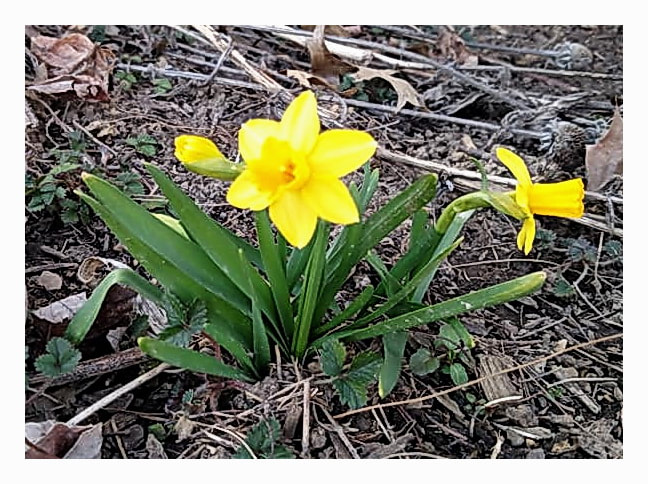|
Good will come from this. We can see good breaking out just as the daffodils are pushing the dirt aside, paying little attention to late snow. [Thanks to Krisana for the picture she posted between snow falls.] Here are examples to give us perspective:
Schools are closing. What are working parents to do? Suddenly children are home without supervision or care. We’ve heard of people helping out by taking in a couple of kids, turning their family room into a play-classroom. Some take turns being hosts. This sort of neighborly cooperation has almost disappeared, but now a whole new generation is rediscovering it. Restaurants and bars are closing. (In Illinois it’s to be statewide. In San Francisco the whole city is on “lock down” with only people performing essential services allowed out of their houses). What are food service workers to do? What about hungry people, for that matter? They have to adapt. Some restaurants are providing curb service, although not quite in the manner we got from A&W Root Beer stands or Stake and Shake. I don’t think bars can do that. Cloth-napkin restaurants may have to scale down. We are just beginning to see a return to food distribution as it used to be. Some of us may actually learn to cook a thing or two. Universities are closing. Very large Bangkok University today announced two weeks suspension of classes after a student was found to possibly have COVID 2019. Assumption and Mahidol universities are also partially closed. Officials have hinted that all schools and colleges in the country might be closed as early as next week. What now? The immediate response we’ve heard about is to re-design instruction to be provided on-line at a distance. This is nudging traditional colleges to “get modern” and for regulatory agencies to reform. There are many ways of providing high quality education. This crisis will get some of those ways unstuck. Travel options are shut down. This is going to upset lots of plans, but what are people away from their home countries going to do? What about international students? I can imagine students who would otherwise have slipped into their institutions, into their enclaves inside, and into their degrees and trips back home, without ever having really seen American family life. Now, behold, they might be invited into guest rooms and family experiences they never expected. Those families might discover their first international “family members.” It’s about time. My point is opportunities for good are emerging. Every hour brings new accounts of this cooperation and adaptation taking place as a result of good-will confronting sheer necessity. Whole new categories of good things are being suggested, explored, and undertaken. Some of those avenues might lead to breakthroughs into alternative political, economic, and environmental constructs. It sometimes takes a crisis right in our face to crack us open to tough change. If Chiang Mai were to be put on a San Francisco type of lock-down, I can’t imagine how we’d get through two or three weeks, but we’d be better off than hundreds confined to condominiums. We live in a village. Small communities are hothouses for cultivating creative care and kindness.
0 Comments
Leave a Reply. |
AuthorRev. Dr. Kenneth Dobson posts his weekly reflections on this blog. Archives
March 2024
Categories |
| Ken Dobson's Queer Ruminations from Thailand |
|

 RSS Feed
RSS Feed
